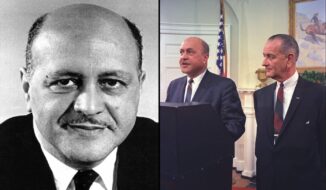
65 years ago today, the 1st Party Congress of the PRC adopted the first official system of Hanyu Pinyin—the romanization of Mandarin Chinese, allowing more than 2 billion people whose native language uses the Latin alphabet to learn Chinese. In 1955 the Chinese government placed Zhou at the head of a committee to reform the Chinese language to increase literacy. While other committees oversaw the tasks of promulgating Mandarin Chinese as the national language and creating simplified Chinese characters, Zhou’s committee was charged with developing a romanization to represent the pronunciation of Chinese characters. READ about this simple, intuitive system… (1958)

Zhou said the task took about three years, and was a full-time job. Each character was divided into two parts, the vowel and the final. Learning the pronounciation of each character in Pinyin is relatively straight-forward after learning which Roman letters which Zhou used to express each sound: for example his name isn’t “Zhou” as a Latin alphabet speaker would say it, but rather “Joe.”
Above either the vowel or the final rests a tone mark—Mandarin being a language where tonal inflection is used to diferentiate words from each other. For example one of Zhou’s early books was 中国拼音文字研究, or “Zhōngguó pīnyīn wénzì yánjiū.” The first word means China, and consists of the first and second tones, the first made flat like the ringing of a bell, the second with a slight upturn similar to how Latin speakers express questions.
MORE Good News on this Date:
- The Society of Friends (Quakers) petitioned the U.S. government to abolish slavery (1790)
- First session of the U.S. Senate opened to the public (1794)
- Leslie Nielsen, the beloved Canadian comic actor, star of Airplane! and The Naked Gun, was born (1926)
- General Motors recognized the United Auto Workers Union to end a strike (1937)
- The Beatles performed their first concert in the United States, in Washington D.C. (1964)
- Vietnam released first American prisoners of war (1973)
- China lifted a ban on Aristotle, Shakespeare and Dickens books (1978)
- The Episcopal Church named its first woman bishop (1989)
- The Unrepresented Nations and Peoples Organization formed to represent self-proclaimed “indigenous peoples, minorities, and unrecognized or occupied territories (1991)
- The Egyptian Revolution culminated in the resignation of Hosni Mubarak and the transfer of power to the Supreme Military Council after 18 days of mostly peaceful mass protests (2011)
97 years ago today, one of the most iconic chefs in the modern era, Paul Bocuse, was born. Bocuse is credited with many things, and it’s difficult to summarize his accomplishments and legacy but to name a few, he has been named “Chef of the Century,” holds the record for consecutive yearly 3-star awards by Michelin at his restaurant, l’Auberge du Pont de Collonges (55-years) and had his name placed upon what is sometimes considered the unofficial world’s best chef award, the “Bocuse d’Or,” or “Golden Bocuse”. He is credited with the formulation of the French nouvelle cuisine, which is less opulent and calorific than the traditional cuisine classique, and stresses the importance of fresh ingredients of the highest quality.

Some of his dishes changed the world of gastronomy, perhaps the most famous being the simply titled Truffle Soup, which Bocuse came up with during a lunch for the French President Valéry Giscard d’Estaing in 1975, whose initials are still found on every specially made soup bowl in the restaurant.
Then there are the much more extravagant Maine Lobster Salad, Duck with Foie Gras, and the deceptively named Mullet with Crispy Potato Chips. Hare a la Royale, a rabbit cooked in a sauce of cream, truffles, and the animal’s own blood, is another extremity of French cuisine, as is the Sea Bass in Pastry shown below. Nothing can top the delicious absurdity though, of a rare chicken cooked in a sauce of truffles, cheese and cream inside of a pig’s bladder, through the agonizingly slow means of gently pouring rich soup broth over it until it swells up like a balloon. These were all wonderfully displayed, as well as Bocuse’s exceedingly kind demeanor, in the Lyon, France episode of Anthony Bourdain Parts Unknown.

Bocuse died in 2018 of Parkinson’s at 91 years of age, in the same room in which he was born, above the Collonges-au-Mont-d’Or, the building that still hosts his flagship restaurant. (1926)
Happy Birthday to actress Jennifer Aniston who turns 54 years old today.

Aniston became a breakout star on the Emmy winning sitcom Friends—and with film hits like The Break-Up, Just Go With It, Horrible Bosses, and Marley & Me, Jen is one of the highest paid actresses in Hollywood.
Aniston has been a celebrity advocate for numerous charities and received attention for her own donations such as $500,000 to Doctors Without Borders, Partners In Health in Haiti, and AmeriCares. She donated $500,000 to the Red Cross and another $500,000 to the Ricky Martin Foundation in 2017 to help victims of hurricanes Harvey, Irma and Maria. (1969)

And, 92 years ago today, the actor, director, and producer Burt Reynolds was born. Reynolds was once turned down for a film in 1957 because he looked too much like Marlon Brando, so he grew his trademark thick mustache to solve that problem. Over his long career, he starred in and won awards for many television series and feature films, such as The Longest Yard and The Cannonball Run.
His 1972 breakout performance in Deliverance made him a star, but his role in Smokey and the Bandit made him wealthy. He said in his 1974 memoir that he never would have had the same career without Johnny Carson, the host The Tonight Show, who frequently invited him as a guest or guest host. He later wrote another memoir with other great stories. (1931–2018)
62 years ago today, Robert Weaver became the first African-American to be appointed to a U.S. cabinet-level position. Weaver was named the administrator of the U.S. Housing and Home Financing Agency by President John Kennedy.
Soon, the economist, academic, and administrator became the first ever Secretary of Housing and Urban Development (H.U.D.), when the department was newly established by President Lyndon Johnson to deal with urban issues, like substandard and aged housing in many cities, and problems of unemployment.
The Washington, DC native held more Harvard degrees at the time—three, including a doctorate in economics—than anyone else in the administration’s upper ranks.
27 years earlier, with a reputation for knowledge about housing issues, Weaver was invited to join President Franklin Roosevelt’s Black Cabinet, which included 45 prominent Black men and women given positions in executive agencies, to advise him on public policy. (1961)

33 years ago today, Nelson Mandela was freed from a South African prison after more than a quarter century locked up as the leader of the banned African National Conference. Four years later he became that country’s first black president.
WATCH the euphoria that day as Nelson Mandela walks into freedom after 27 years behind bars… (1990)
SHARE the Milestones, Memories, and Music…